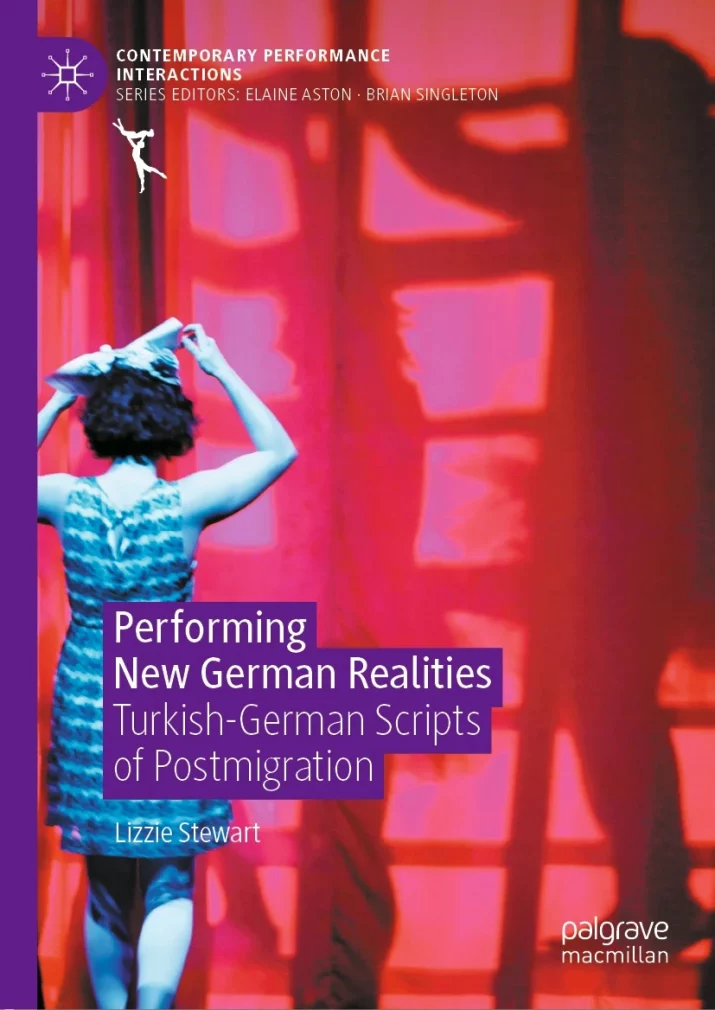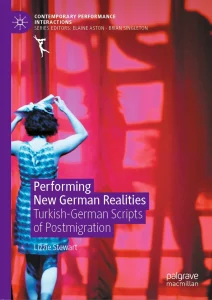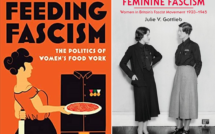
This is part of our special feature, Decolonizing European Memory Cultures.

The cultural and aesthetic impact of the largest minority in Germany—Turkish immigrants and their descendants—has been overlooked for far too long. For many years, writers, dancers, theater practitioners, choreographs, filmmakers, or painters, who had either immigrated themselves or were descendants of immigrants, were labeled as foreigners, migrants, and Others, and their art was reviewed through an ethnic lens that placed them either in the margins or even outside of German society. This phenomenon has been observed in the film, fine arts, and literature sectors, but it has been the clearest in the field of theater and performance. Indeed, since the beginning of the German postmigrant theater movement, at the beginning of the twenty-first century, there has been a slow shift in Germany toward acknowledging postmigrant society, which has been deeply transformed through migration. Moreover, interest in “immigrantized” and “minoritized” artists and their art has steadily grown. However, discriminatory labels have remained on the artistic work of theater practitioners of Turkish descent, who are expected to perform a certain role on stage and in society.In
Performing New German Realities: Turkish-German Scripts of Postmigration, Lizzie Stewart theorizes the on- and off-stage role Turkish-German Theater practitioners have been asked to play in German theater. She examines the relationship between theater and migration in contemporary Germany by focusing on theatrical production arising from scripts by German-language playwrights of Turkish origin. Theater, as an art form and a historical institution, has had a highly symbolic position within the German nation-state and nation-building, a position which has been combined with the late recognition of Germany as a country of immigration. Therefore, Stewart is interested in the ways in which the stagings of plays by artists from Turkish descents have been entangled in, co-opted by or used to critique discourses on ethnicity, racialized perceptions, and the politics of belonging. Thus, her study critically interrogates how migration and “migrantized” figures have been represented by these artists.
Performing New German Realities focuses on two Turkish-German playwrights, Emine Özdamar and Feridun Zaimoglu (writing with Günter Senkel for the stage). Both are well-known for their award-winning prose work but have been less recognized for their plays, which can be read as a prelude to postmigrant theater and/or postmigration. For example, Zaimoglu’s plays have participated in the shaping of the early Ballhaus Naunynstrasse, which has traditionally served as a theatre venue for migrant artists to produce and present their art. Since 2008, Ballhaus Naunynstrasse has become the heart of “postmigrant theater,” first under the artistic leadership of Shermin Langhoff and since 2013 of Wagner Carvalho. In her book, Stewart chooses five plays that have been written over the course of more than three decades and presents them in chronological order to engage in the ways in which the reality of Germany, as a country of immigration, has been performed. She follows the scripts through their journey into publishers’ catalogs and, from there, into the hands of directors, dramaturges, scenographers, and actors and finally on stage into performance. Here, the analysis focuses on how these scripts have impacted the institutional changes occurring around them, which Stewart characterizes as an institutional rescripting. By exploring the artistic relationships pertaining to each production and the negotiations at work between text and performance, writer and director, ensemble and audience, and conception and reception, Stewart examines the relationship between the behavioral scripts German society expects of its migrantized subjects. She also explores the literal scripts produced by those subjects and the multiple ways in which the productions of plays arising from these scripts enable new realities within and beyond the theatrical sphere for subjects as well as society.
After decades of writing and publishing an impressive body of work, Özdamar has become appreciated as an important Turkish-German artist. However, until now, her early work in acting and, later on, her role as a playwright have been less considered. In her analysis, Stewart includes two plays: Karagöz in Alamania, written in 1982, and the commissioned play Perikizi, written in 2010. Both plays mark the beginning of Özdamar‘s career in Germany and the beginning of her broader notoriety. Karagöz in Alamania is a play about Karagöz, who migrates to Germany with his donkey to meet Dr. Mabuse; the play has been called the “first full-length ‘Gastarbeiter’-Drama” (61), was published as a manuscript, and then staged in 1986 at Schauspiel Frankfurt under Özdamar’s own direction. Perikizi was one of six commissioned plays for the theatrical project Odysee Europa in 2010; the play tells the story of a young woman from Turkey who, despite all odds, leaves to fulfill her dream of becoming an actress in Germany, where she is confronted with her displacement and the dissonance between dream and reality. While Karagöz in Alamania was poorly received at the time of its production and deemed a failed experiment, Perikizi was highly celebrated by critics. In both cases, Stewart traces the social, political, and aesthetical conditions in which the plays were embedded, exposing the position in which Özdamar and her plays were placed within the German theater scene; indeed, Özdamar was seen as a representative of “Gastarbeiter” in the 1980s, a “Turkish artist” in 2010, and ultimately as an Other who was not part of the German theater scene. Stewart reminds us that “work such as Özdamar’s remains potential unless taken on by a theater willing to stage the play and an audience interested in recognizing the approach to reality presented” (95).
Throughout his career, Zaimoglu has explored the theme of the enfant terrible, appropriating derogatory language and stereotypical representations as a way of empowering racialized subjects. Therefore, his scripts have taken a different trajectory than Özdamar’s. With Senkel, he wrote three plays; these works include their dramatic debut, Othello (2003), which was followed by their most successful play, Schwarze Jungfrauen (Black Virgins, 2006), and finally, Schattenstimmen (Shadow Voices, 2008). All three plays participated in the early shaping of postmigrant theater as a theatrical movement. In 2003, Othello constituted an adaptation of the classic play for the German context, a “Turkish-German rewrite” that was performed at the Münchner Kammerspiele. Although the play was generally criticized for its vulgar language, it was also highly celebrated as the first of many other rewrites of Western canons by BIPOC theatre practitioners for German stages. Zaimoglu’s third play, Black Virgins, premiered in 2006 at Hebbel am Ufer (HAU) Berlin at the festival Beyond Belonging curated by Shermin Langhoff and has been deemed to be the first successful “postmigrant theater” play. The play is considered to be a semi-documentary seemingly based on interviews with so-called Neo-Muslima. Here too, the language used includes sexist and racial slurs, as well as slang, to reroute the audience toward the blurry lines that separate Islamic indoctrination and female self-expression and ultimately to undermines the public’s view of the “oppressed veiled Muslim women.” Stewart reveals how the staging has also distanced itself from legitimacy and authenticity to enable a more visionary approach to representation. Zaimoglu’s third play, Black Virgins, was the first play to be published in the prestigious theater journal Theater Heute, marking the beginning of the success of postmigrant theatre. Finally, Shadow Voices is also a semi-documentary; it was commissioned by Schauspiel Köln in 2008 and engages with enforced and undocumented migration. The engagement with this play, also published in Theater Heute, was less successful for several reasons. Indeed, the play reproduces a highly problematic colonial narrative in the name of self-representation and problematizes the “institutional dynamics at work within the theater industry, and the extent to which the documentary turn risks ‘laminating’ particular aesthetic expressions onto postmigrant theater practitioners” (188).
Performing New German Realities: Turkish-German Scripts of Postmigration is a compelling study that enables the reader to engage with an area of German theater that has been mostly unexplored until today. By working from the script outward, Stewart offers a broader view into the complex artistic and practical negotiations surrounding the presence and absence of Turkish German writers, directors, and performers on the contemporary German stage. Her analysis of the plays exposes an invisible and long history of theater and performance by migrantized (and minoritized) artists beyond the beginning of Ballhaus Naunynstrasse. The genealogies of the staging of the plays reveal the racializing parameter that German cultural policy has imposed on migrantized artists of Turkish descent and the discrepancies between representations of Turkish-German lived experience and envisioned and experimental embodiments. In her study, Stewart manages to capture in the best sense the discontinuity and fragmentation of the artistic and aesthetic history of German-Turkish playwrights and their plays within a white frame, i.e., within the German theater scene. She connects those dots that have been loosely floating in the German theater realm. Performing New German Realities is a read for anyone who is interested in a fuller picture of German theater from its margins.
Azadeh Sharifi is a Visiting Assistant Professor (DAAD-Gastprofessur) at the Department of Germanic Languages and Literatures, University of Toronto. Her work engages with (post)colonial and (post)migrant theater and theater history in Germany and performances by migrant and marginalized artists in contemporary European performances. Her latest publication, Theaterwissenschaft postkolonial/dekolonial, which she edited with Lisa Skwirblies, was published in summer 2022 by transcript Verlag.
Performing New German Realities: Turkish-German Scripts of Postmigration
By Lizzie Stewart
Publisher: Palgrave Macmillan
Hardcover / 321 pages / 2021
ISBN: 9783030698485
Published on February 21, 2023.




